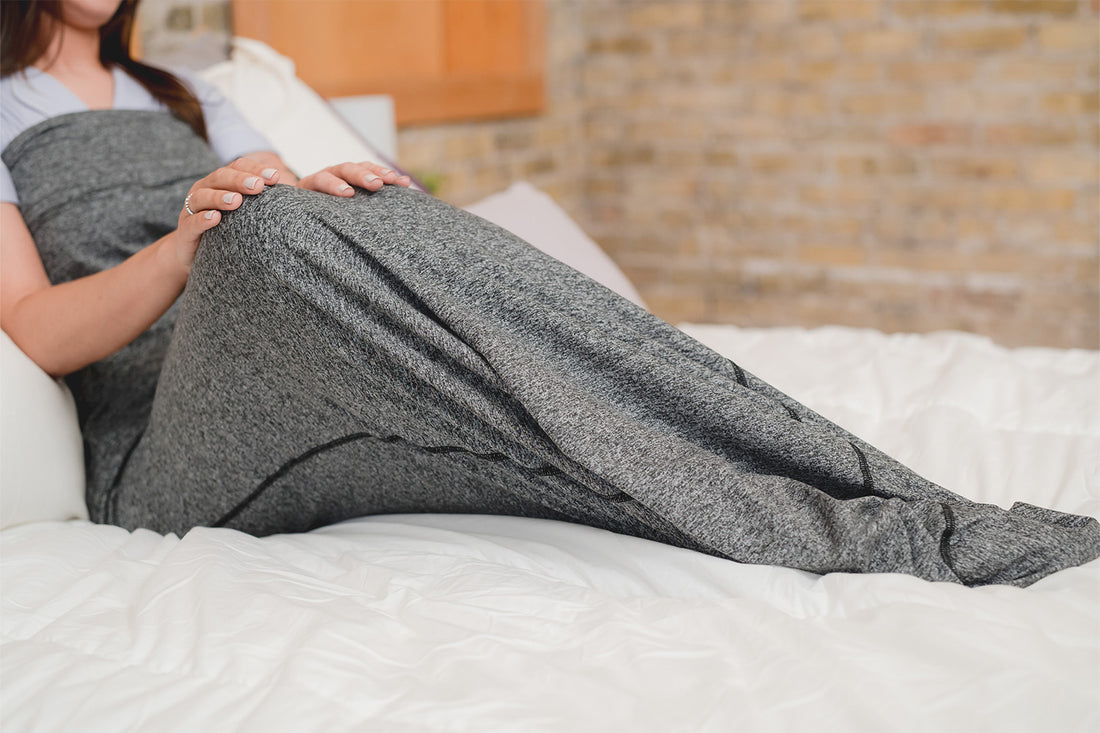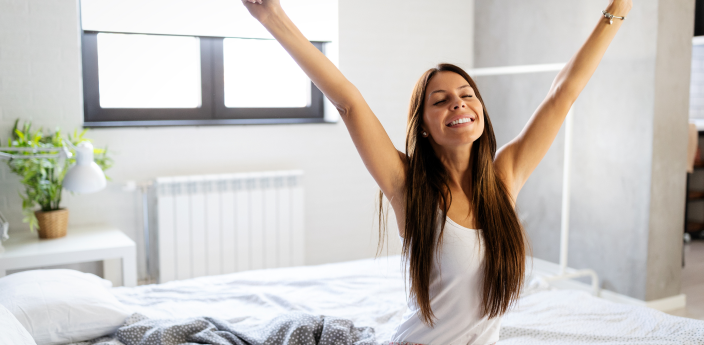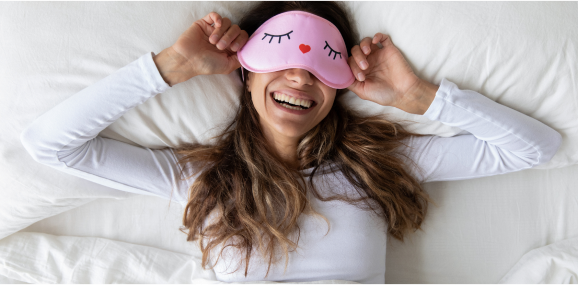There are few things more annoying than lying awake in bed. The sheep counting didn’t help and changing positions didn't work. Now what?
The truth is, there can be a variety of issues that can keep you tossing and turning at night, leaving you unable to fall asleep.
Maybe you’ve got something on your mind, and something that breeds stress and anxiety. Or it could be a sleep disorder. Or that last cup of coffee you had a couple hours before bed.
Thankfully, there are some things you can do when you find sleep elusive, and binge-watching your favorite TV show isn’t one of them. (Sorry.)
The Science of Sleep
Sleep is a complex process that affects the entire body — it is absolutely essential for our health and wellness.
Sleep is broken into four stages. As we sleep, we progress through these stages multiple times a night. This progression is known as the sleep cycle. During these stages, our bodies slowly drift into deeper and deeper sleep.
Deep sleep, or slow-wave sleep, during Stage 3 of the sleep cycle is where the most restorative sleep occurs.
However, none of that matters if you find yourself wide awake, unable to get the process of sleep started in the first place.
Sleep and Our Health
Sleep has serious health implications both for the body and the mind, which means it isn’t optional.
For example, sleep has a pivotal role to play in keeping our immune system well-balanced and ready to fight when illness rears its head. Inadequate sleep negatively affects our immunity.
In terms of our mind, sleep also has a big impact on our mood. A restful night’s sleep could make the difference between a pleasant day or a grouchy one.
Poor sleep can also contribute to depression, daytime sleepiness, high blood pressure, and even chronic pain.
When we sleep better, we feel better. It’s as simple as that.
The National Sleep Foundation recommends that adults get somewhere between 7 and 9 hours of sleep every night. That number is higher for children and teens.
Some Reasons for Poor Sleep Quality
So, the importance of healthy sleep cannot be overstated. But the ideal is not always the reality. Poor sleep happens from time to time, a few restless nights here and there aren’t the end of the world.
Lying awake at night can have a variety of causes, from poor sleep habits to stress and anxiety.
Here are a few examples of things that can keep you from restful sleep:
- Drinking caffeine or alcohol too close to bedtime.
- Eating big meals before bed (digestion can keep you awake).
- Irregular sleeping patterns and sleep schedule.
- Using electronic devices, like laptops or phones, before or in bed (the blue light emitted from screens can disrupt your sleep rhythm, known as your circadian rhythm).
- Working out right before bed (too many endorphins flowing).
- Sleeping in a poor sleep environment — the bedroom is too noisy, too hot, or has too many lights that disrupt the sleep hormone, melatonin.
- Stress and anxiety keeping you awake.
Things To Do When You Can’t Fall Asleep
The items above are just a few of the most common reasons that keep people from falling asleep at night — there are more. Thankfully, there are some things you can do when you can’t seem to fall asleep.
Relax and Don’t Get Discouraged
Don’t stress (easier said than done).
If you find yourself tossing and turning don’t get frustrated. Stress and anxiety are no friends when it comes to sleep.
Cultivating a relaxing bedtime routine is essential, and this starts with your bedroom environment – keep it cool, dark, and quiet.
You may have your own relaxation techniques already that can help you break the vicious cycle of sleeplessness. Aromatherapy using essential oils like lavender can promote relaxation, and white noise, yoga, and the simple act of putting on socks can also help calm your mind.
The Sleep Pod can help!
Sleep requires relaxation. But, if stress and feelings of anxiety are an issue, the Sleep Pod may be of benefit. The Sleep Pod utilizes a therapy technique known as Deep Touch Pressure Stimulation (DTPS), which has been proven to help reduce feelings of anxiety.
The Sleep Pod aids relaxation by providing gentle compression throughout the night.
It’s Okay To Get Up
If you’ve been lying wide awake in bed for 30 minutes or more it is completely fine to get out of bed.
In fact, lying there restlessly could make issues worse.
Get up and find a low-key activity to do, like a warm bath, warm shower, practicing mindfulness meditation, or listening to soft music.
Try Progressive Muscle Relaxation
Progressive muscle relaxation (PMR) is a stress management technique that could prove helpful if you find yourself lying awake at night in need of relaxation.
Used to reduce physical tension, PMR also helps create a calming effect by gradually tightening and relaxing muscle groups.
Lying on your back, tense each muscle group — holding each for 10 seconds and then relaxing. Start at your feet and move upwards, avoiding any areas that cause pain. Oh, and don’t forget to breathe.
Read a (Boring) Book
Seriously. If you find yourself unable to fall asleep, sometimes all it takes to get you sleepy is reading a boring book. Reading allows your mind to wander a bit, shifting focus from not being able to sleep to something else.
But why a boring book? Well, the point is to reorient your mind while your body relaxes.
Reading your favorite thriller may not be the best idea if you’re looking to wind down.
Also, avoid tablets and e-books as blue light from electronics can also disrupt sleep.
Create a To-Do List
One of the things that keeps people tossing and turning at night is worrying about the next day. It is very easy to stress out when you focus and contemplate on future tasks. They can make you feel overwhelmed, even before they arrive.
While planning is important, worrying is not.
To alleviate the anxiety and alertness of worrying about tomorrow’s tasks, some people find it helpful to create to-do lists.
These lists give you an opportunity to get the thoughts on paper and out of your mind. Give it a shot.
Knock Out Some Chores
If you find yourself lying awake at night unable to fall asleep, it may be helpful to knock out a small chore or two. It could be a simple task, like picking up clutter in the living room or dusting some shelves.
At the end of the day, completing a small chore may help bring some closure to the day while helping take your mind off other stressors.
If you do choose to knock out a chore or two, make sure it isn’t strenuous — the goal is not to work up a sweat.
Do Some Journal Writing
Similar to reading a book, journal writing may also help take your mind off things.
Writing down your thoughts or feelings could help alleviate some stress and anxiety.
One sleep study found that journaling at bedtime helped decrease levels of mental distress in participants.
Some Things to Avoid
We already discussed the importance of avoiding caffeine, alcohol, and large meals before bed. So, if you can’t seem to fall asleep, don’t make the mistake of thinking these will help you catch some zzzs.
Also, fight the urge to pull out the phone. While being unable to fall asleep might cause boredom, don’t make the mistake of scrolling through your apps. The blue light that is emitted from electronics sends mixed signals to your brain and can actually throw a wrench in your sleep-wake cycle.
Finally, avoid clock watching. Constantly checking the time does you no favors when it comes to falling asleep, typically it just builds more anxiety. Don’t obsess about it. Turn the clock away if you have to.
Conclusion
Lying wide awake in bed, being unable to fall asleep is one of the most annoying things. You might even be tired and know that you need to get to sleep, but you simply can’t.
We’ve all experienced those nights; nights spent staring at the ceiling or watching movies while the clock ticks the night away. But good quality sleep is not optional, it’s essential for our health.
The reason for lying awake can have a variety of causes, from unhealthy bedtime habits and routines, medical conditions like sleep apnea or restless legs syndrome, irregular sleeping patterns, too many energy drinks during the day, or stress and anxiety.
A consistent sleep schedule, cool body temperature, and a cozy blanket may be all you need to get a better night’s sleep and ease symptoms of insomnia.
Regardless of the cause, there are some tips when you find yourself unable to fall asleep. The first step is not getting discouraged, it happens, so don’t stress.
The next step is up to you.
Sources:
Sleep & Immunity: Can a Lack of Sleep Make You Sick? | Sleep Foundation
Relationship Between Sleep Quality and Mood: Ecological Momentary Assessment Study | NIH
How Blue Light Affects Sleep | Sleep Foundation
Relaxation Techniques: What You Need To Know | NCCIH

































500,000+ happy customers